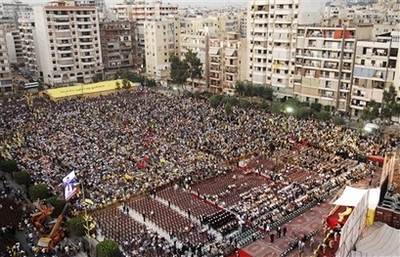 Five Lebanese prisoners freed by Israel arrived to a hero’s welcome in Lebanon Wednesday, hours after Hizbullah handed over the bodies of two Israeli soldiers seized two years ago. They were then flown by helicopters to Beirut, where they were accorded a red-carpet welcome by Lebanese President Michel Sleiman, Prime Minister Fouad Siniora, Parliament Speaker Nabih Berri, the entire Cabinet and a host of lawmakers and religious leaders. The five – Kontar and Hizbullah fighters Khaled Zidan, Maher Kourani, Mohammad Srour and Hussein Suleiman – stood on a platform as Sleiman spoke before shaking hands with politicians lined up to greet them. "Your return is a new victory and the future in your presence will be a path in which we will realize the sovereignty of our territory and the liberty of our people," Sleiman said. "I tell Samir and his companions that they have a right to be proud of their country, their army and their resistance." Kontar kissed his mother, Siham, 71, after the meet and greet with the politicians as crowds and the media swarmed around him. His mother had burst into tears earlier while waiting at the airport when she was told her son had arrived in Naqoura and was indeed free after more than 28 years in jail. "I never gave up hope for a day," she said, choked by emotion. "This moment makes up for 30 years of waiting. I want to hug and kiss him. My only wish is to see him." The four freed Hizbullah fighters were captured in the July-August 2006 war. They and Kontar were the last remaining Lebanese prisoners in Israel. "This new victory completes the victory of the July war," Kontar told Hizbullah television Al-Manar. Hizbullah chief Sayyed Hassan Nasrallah gave a speech in Beirut’s southern suburbs, where tens of thousands of people gathered Wednesday evening to hail his success in emptying Israeli jails of Lebanese prisoners. The five prisoners were released in exchange for the bodies of two Israeli soldiers, Ehud Goldwasser and Eldad Regev, captured on July 12, 2006. The fate of the two soldiers was not known until their bodies were returned to Israel Wednesday morning. "Today we hand over Ehud Goldwasser and Eldad Regev," Hizbullah official Wafiq Safa said in Naqoura, as men placed two black coffins on the ground amid a crowd of onlookers. The mood in Israel had been sombre as it waited to learn the fate of Goldwasser and Regev.
Five Lebanese prisoners freed by Israel arrived to a hero’s welcome in Lebanon Wednesday, hours after Hizbullah handed over the bodies of two Israeli soldiers seized two years ago. They were then flown by helicopters to Beirut, where they were accorded a red-carpet welcome by Lebanese President Michel Sleiman, Prime Minister Fouad Siniora, Parliament Speaker Nabih Berri, the entire Cabinet and a host of lawmakers and religious leaders. The five – Kontar and Hizbullah fighters Khaled Zidan, Maher Kourani, Mohammad Srour and Hussein Suleiman – stood on a platform as Sleiman spoke before shaking hands with politicians lined up to greet them. "Your return is a new victory and the future in your presence will be a path in which we will realize the sovereignty of our territory and the liberty of our people," Sleiman said. "I tell Samir and his companions that they have a right to be proud of their country, their army and their resistance." Kontar kissed his mother, Siham, 71, after the meet and greet with the politicians as crowds and the media swarmed around him. His mother had burst into tears earlier while waiting at the airport when she was told her son had arrived in Naqoura and was indeed free after more than 28 years in jail. "I never gave up hope for a day," she said, choked by emotion. "This moment makes up for 30 years of waiting. I want to hug and kiss him. My only wish is to see him." The four freed Hizbullah fighters were captured in the July-August 2006 war. They and Kontar were the last remaining Lebanese prisoners in Israel. "This new victory completes the victory of the July war," Kontar told Hizbullah television Al-Manar. Hizbullah chief Sayyed Hassan Nasrallah gave a speech in Beirut’s southern suburbs, where tens of thousands of people gathered Wednesday evening to hail his success in emptying Israeli jails of Lebanese prisoners. The five prisoners were released in exchange for the bodies of two Israeli soldiers, Ehud Goldwasser and Eldad Regev, captured on July 12, 2006. The fate of the two soldiers was not known until their bodies were returned to Israel Wednesday morning. "Today we hand over Ehud Goldwasser and Eldad Regev," Hizbullah official Wafiq Safa said in Naqoura, as men placed two black coffins on the ground amid a crowd of onlookers. The mood in Israel had been sombre as it waited to learn the fate of Goldwasser and Regev.
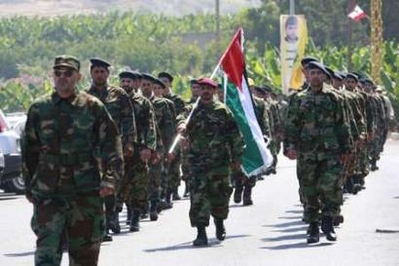 LEBANON/ISRAEL BORDER (Reuters) – Israel handed over five Lebanese prisoners to Hezbollah via the Red Cross on Wednesday after the group returned the bodies of two Israeli soldiers seized in a cross-border raid in 2006. Among the men who arrived at the border in an International Committee of the Red Cross convoy was Samir Qantar, Israel’s longest-serving Lebanese prisoner. Wearing jeans and a grey sweater, he was mobbed by reporters and well-wishers on arrival. Hezbollah has prepared a triumphal welcome for the five men freed under a deal seen by many Israelis as a painful necessity, two years after the two soldiers’ capture sparked a 34-day war that killed about 1,200 people in Lebanon and 159 Israelis. Israel retrieved the corpses of Ehud Goldwasser and Eldad Regev only after agreeing to release Qantar, who had been serving a life term for the deaths of four Israelis, in a 1979 Palestinian guerrilla raid on an Israeli town.
LEBANON/ISRAEL BORDER (Reuters) – Israel handed over five Lebanese prisoners to Hezbollah via the Red Cross on Wednesday after the group returned the bodies of two Israeli soldiers seized in a cross-border raid in 2006. Among the men who arrived at the border in an International Committee of the Red Cross convoy was Samir Qantar, Israel’s longest-serving Lebanese prisoner. Wearing jeans and a grey sweater, he was mobbed by reporters and well-wishers on arrival. Hezbollah has prepared a triumphal welcome for the five men freed under a deal seen by many Israelis as a painful necessity, two years after the two soldiers’ capture sparked a 34-day war that killed about 1,200 people in Lebanon and 159 Israelis. Israel retrieved the corpses of Ehud Goldwasser and Eldad Regev only after agreeing to release Qantar, who had been serving a life term for the deaths of four Israelis, in a 1979 Palestinian guerrilla raid on an Israeli town.
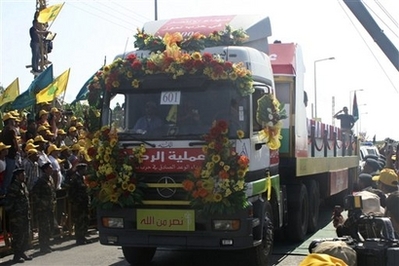 Hezbollah also received the bodies of almost 200 people, including the body of Dalal al-Maghrebi, a female fighter with the Palestinian Fatah movement. Before the exchange there had been speculation that at least one of the Israeli soldiers had been alive, but Hezbollah TV confirmed that both were dead. Two coffins containing the bodies were taken in Red Cross vehicles across the border from Lebanon into Israel to be identified. ‘Difficult decision’ The prisoners were brought across the border in a convoy of four International Committee of the Red Cross vehicles and were greeted by Wafiq Safa, Hezbollah’s chief prisoner swap negotiator."The Israeli cabinet agonised over it [the exchange] and voted in favour of it against the advice of the Israeli intelligence service … which thinks it will only encourage kidnappings," David Chater, Al Jazeera’s correspondent in Israel, said. "But the bulk of Israeli public opinion is behind this deal," he said, reporting from Rosh Hanikra – the Israeli side of the border – where he said there was a strong military presence ahead of the exchange. Miri Eisin, a former aide to Ehud Olmert, the Israeli prime minister, said Israel found the release of Kuntar an "incredibly difficult decision". "Today in Israel we are mainly reflecting on the price we pay in our country to defend our borders," she told Al Jazeera. At the family home of reservist Regev, a crowd of about 50 mourners gathered and his family wept, seeing their son’s coffin displayed on television for the first time. "Eldad! Eldad! What have they done to you?" Hana, Regev’s aunt, said.
Hezbollah also received the bodies of almost 200 people, including the body of Dalal al-Maghrebi, a female fighter with the Palestinian Fatah movement. Before the exchange there had been speculation that at least one of the Israeli soldiers had been alive, but Hezbollah TV confirmed that both were dead. Two coffins containing the bodies were taken in Red Cross vehicles across the border from Lebanon into Israel to be identified. ‘Difficult decision’ The prisoners were brought across the border in a convoy of four International Committee of the Red Cross vehicles and were greeted by Wafiq Safa, Hezbollah’s chief prisoner swap negotiator."The Israeli cabinet agonised over it [the exchange] and voted in favour of it against the advice of the Israeli intelligence service … which thinks it will only encourage kidnappings," David Chater, Al Jazeera’s correspondent in Israel, said. "But the bulk of Israeli public opinion is behind this deal," he said, reporting from Rosh Hanikra – the Israeli side of the border – where he said there was a strong military presence ahead of the exchange. Miri Eisin, a former aide to Ehud Olmert, the Israeli prime minister, said Israel found the release of Kuntar an "incredibly difficult decision". "Today in Israel we are mainly reflecting on the price we pay in our country to defend our borders," she told Al Jazeera. At the family home of reservist Regev, a crowd of about 50 mourners gathered and his family wept, seeing their son’s coffin displayed on television for the first time. "Eldad! Eldad! What have they done to you?" Hana, Regev’s aunt, said.
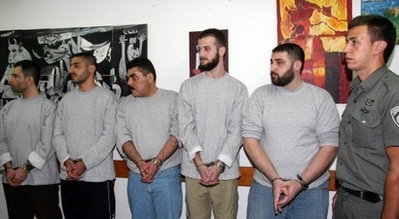 The four others are Hezbollah fighters captured in the 2006 conflict. All five were to be flown to Beirut ahead of a huge Hezbollah rally to welcome them in the evening. President Michel Suleiman, Prime Minister Fouad Siniora and Parliament Speaker Nabih Berri were all expected to greet the former captives at the airport in a show of unity in Lebanon, which marked the occasion with a public holiday. The ICRC drove the five released men to the headquarters of U.N. peacekeepers at the border village of Naqoura, where Hezbollah earlier handed over two black coffins containing the Israeli soldiers. The Israeli army later said forensic teams had identified the cadavers as those of its missing men. Hezbollah had never disclosed whether they were alive or dead. It has not been clear how they met their deaths. "The Israeli side will now hand over the great Arab mujahid (holy warrior) … Samir Qantar and his companions to the ICRC," Hezbollah official Wafik Safa said after delivering the bodies.
The four others are Hezbollah fighters captured in the 2006 conflict. All five were to be flown to Beirut ahead of a huge Hezbollah rally to welcome them in the evening. President Michel Suleiman, Prime Minister Fouad Siniora and Parliament Speaker Nabih Berri were all expected to greet the former captives at the airport in a show of unity in Lebanon, which marked the occasion with a public holiday. The ICRC drove the five released men to the headquarters of U.N. peacekeepers at the border village of Naqoura, where Hezbollah earlier handed over two black coffins containing the Israeli soldiers. The Israeli army later said forensic teams had identified the cadavers as those of its missing men. Hezbollah had never disclosed whether they were alive or dead. It has not been clear how they met their deaths. "The Israeli side will now hand over the great Arab mujahid (holy warrior) … Samir Qantar and his companions to the ICRC," Hezbollah official Wafik Safa said after delivering the bodies.
The release of the Lebanese prisoners, said by Hezbollah to be the last held in Israel, closes a file that has motivated repeated attempts by the group over the past quarter century to capture Israelis to use as bargaining counters.
The fathers of the two Israeli soldiers spoke of their pain at watching the transfer of their sons’ coffins on television.
PAINFUL REALITY
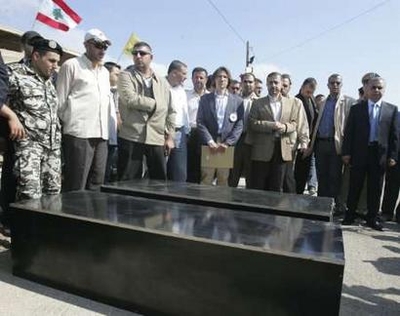 "It is not easy to see this, although there was not much surprise to it. But … confronting this reality was difficult, yes," Shlomo Goldwasser told Israel radio.
"It is not easy to see this, although there was not much surprise to it. But … confronting this reality was difficult, yes," Shlomo Goldwasser told Israel radio.
Zvi Regev said on Army Radio: "It was a terrible thing to see, really terrible. I was always optimistic, and I hoped all the time that I would meet Eldad and hug him."
Goldwasser’s father-in-law, Omri Avni, said of Qantar, who was 17 at the time of the raid: "The despicable murderer who killed the children 30 years ago has gone home, and finally, for the first time in his life has done a good deed by leaving this place and bringing about the return of Ehud and Eldad."
Under the deal, mediated by a U.N.-appointed German intelligence officer, Israel also handed over the bodies of eight Hezbollah fighters slain in the 2006 war, and those of four Palestinians, including Dalal Mughrabi, a woman guerrilla who led a 1978 raid on Israel.
The four were among the nearly 200 Arabs killed trying to attack Israel whose bodies are to be sent to Lebanon. Hezbollah returned the remains of other Israeli soldiers killed in the south.
Israel is also to free scores of Palestinian prisoners at a later date as a gesture to U.N. Secretary-General Ban Ki-moon.
Hezbollah has dubbed the exchange "Operation Radwan," in honor of "Hajj Radwan," or Imad Moughniyah, the group’s military commander who was assassinated in Syria in February.
Yellow Hezbollah flags fluttered across south Lebanon and on the coastal highway from Naqoura to Beirut. "Liberation of the captives: a new dawn for Lebanon and Palestine," a banner read.
Israel denounced the planned festivities.
"Samir Qantar is a brutal murderer of children and anybody celebrating him as a hero is trampling on basic human decency," said Israeli Prime Minister Ehud Olmert‘s spokesman Mark Regev.
For some Lebanese, the swap showed the futility of the conflict with Israel two summers ago. "There shouldn’t have been a war in 2006. A lot of lives were lost," said Rami Nasereddine, 18, lamenting Israel’s refusal to trade captives at the time.
The European Union hailed the prisoner deal as a positive step by both sides that would contribute to regional stability.
The Palestinian Islamist group Hamas said the swap strengthened its own hand in demanding freedom for hundreds of prisoners in exchange for captured Israeli soldier Gilad Shalit.
Palestinian President Mahmoud Abbas offered congratulations to Qantar’s family, the Palestinian news agency WAFA reported.
(Additional reporting by Tom Perry and Nadim Ladki in Beirut, Jeffrey Heller and Dan Williams in Jerusalem and Nidal al-Mughrabi in Gaza; Writing by Alistair Lyon; Editing by Giles Elgood)
Celebrations
While the scene was sombre in Israel, in Lebanon’s Hezbollah-dominated south there was a mood of celebration.
Yellow Hezbollah flags lined the streets in towns and villages across southern Lebanon, as well as along the coastal highway from Naqoura to Beirut, the capital.
One poster read: "Israel is shedding tears of pain, Lebanon is shedding tears of joy."
 |
| In Israel, mourners gathered outside the family home of reservist Regev [Reuters] |
Hezbollah has named the exchange Operation Radwan, in honour of Imad Moughniyah, known as "Hajj Radwan", the group’s military commander who was assassinated in Syria in February.
Sheik Nabil Kaouk, Hezbollah’s commander in south Lebanon, earlier termed Israel’s approval of the prisoner swap an admission of defeat.
"It’s regarded as being the final chapter of the 2006 war," journalist Robert Fisk, a Middle East expert, told Al Jazeera.
"The Israelis certainly lost that war, they did not get their prisoners back – not until now and they’re getting them back dead. So more than 1,000 Lebanese civilians and more than 160 Israelis, most of them soldiers, all died for absolutely nothing and that’s what today’s prisoner exchanges prove."
Lebanon has declared a national holiday to celebrate the prisoner swap.
"This is a big day because it’s the day we [Lebanon] have the liberation of four or five heroes," Wassim Manssouri, a professor in constitutional law at Beirut’s Lebanese University, told Al Jazeera from the capital.
Palestinian reaction
Celebrations were also under way in Ramallah, in the occupied West Bank.
"The exchange is seen as a victory for Arab resistance," Nour Odeh, Al Jazeera’s correspondent, in the West Bank, said.
Kuntar is a member of Lebanon’s Druze population.
Walid Jumblatt, Lebanon’s Druze leader, told Al Jazeera: "My father was the founder of a Lebanese-Palestinian coalition to fight Israel and recover the Palestinians’ rights. My father would be happy."
"I am happy [too], but we should not forget the Palestinians who are detained in their own land," he said.
The Hezbollah exchange has prompted the public in Arab countries such as Jordan and Egypt – which have both signed peace deals with Israel – to question why their governments have not been able to repatriate the bodies of their soldiers.



